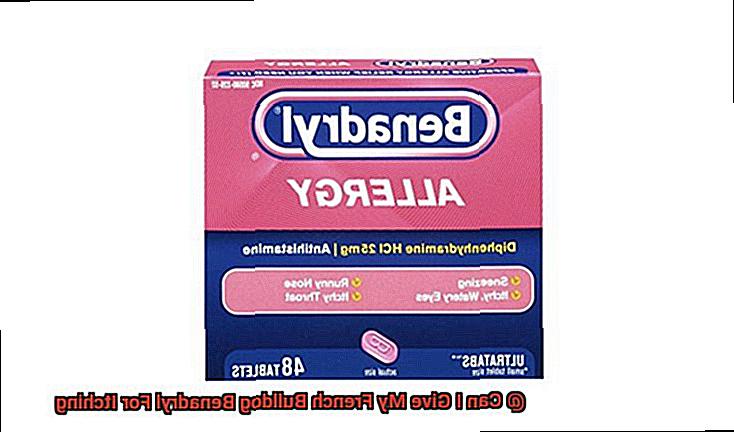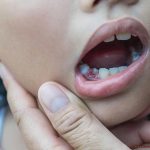Can I Give My French Bulldog Benadryl For Itching?
Picture this: your French Bulldog, with those irresistibly cute wrinkles and a mischievous twinkle in their eyes. But then, the itch strikes. The incessant scratching, the pitiful whimpers—it breaks your heart. You find yourself desperately wondering if you can give them Benadryl to bring some much-needed relief. Well, my fellow Frenchie lover, buckle up because we’re about to embark on a journey through the mysterious world of itchiness and Benadryl.
But hey, remember that I’m just an expert sharing knowledge; always consult your vet before making any decisions.
So let’s dive deep into the topic and uncover whether Benadryl is a superhero or a mere sidekick when it comes to soothing your furry friend’s itchiness.
Understanding the Role of Benadryl in Treating Allergies and Itching in Dogs
Contents
- 1 Understanding the Role of Benadryl in Treating Allergies and Itching in Dogs
- 2 French Bulldogs and Their Risk of Skin Irritations and Allergies
- 3 Consulting a Veterinarian Before Administering Benadryl to Your Dog
- 4 The Appropriate Dosage of Benadryl for French Bulldogs
- 5 Potential Side Effects of Giving Benadryl to French Bulldogs
- 6 Individual Sensitivities to Medication in Dogs
- 7 Alternative Measures to Relieve Your French Bulldog’s Itching
- 8 Working With Your Veterinarian to Develop a Comprehensive Plan
- 9 Conclusion
French Bulldogs are beloved companions known for their unique personalities and adorable appearance. However, these adorable pups can sometimes experience allergies and itching, causing discomfort and distress.
In such cases, Benadryl, an antihistamine commonly used for humans, can be a helpful tool to provide temporary relief. In this article, we will explore the role of Benadryl in treating allergies and itching in French Bulldogs, highlighting the importance of veterinary guidance and comprehensive care.
What is Benadryl?
Benadryl contains the active ingredient diphenhydramine, which blocks histamine receptors in the body. Histamines are chemicals released by the immune system in response to allergens, triggering symptoms such as itching, sneezing, and inflammation. By blocking these receptors, Benadryl can relieve the discomfort caused by allergies and itching.
Veterinary Guidance is Crucial
Before administering any medication to your French Bulldog, it is essential to consult with a veterinarian. They will assess your dog’s specific condition, identify any underlying causes for the itching or allergies, and determine if Benadryl is appropriate for your furry friend. Remember, each dog is unique, and what works for one may not work for another.
Proper Dosage and Administration
Your veterinarian will provide you with the appropriate dosage of Benadryl based on your French Bulldog’s weight and condition. It is crucial to follow their instructions carefully and never exceed the recommended dose. Additionally, your vet will advise you on how often to administer the medication.
Addressing Underlying Causes
While Benadryl can provide temporary relief for allergies and itching, it is important to address the root cause of these issues. Your veterinarian may recommend additional diagnostic tests or alternative treatments to effectively manage your French Bulldog’s condition. This comprehensive approach ensures long-term relief and improved overall well-being.
Potential Side Effects
While Benadryl is generally safe for dogs, it can have potential side effects. These may include drowsiness, dry mouth, urinary retention, and gastrointestinal upset. If you notice any adverse reactions after giving your French Bulldog Benadryl, contact your veterinarian immediately.
Holistic Care for Itching French Bulldogs
In addition to medication, holistic care can help alleviate itching in French Bulldogs. Regular grooming and bathing with appropriate products, a balanced diet rich in essential nutrients, and a clean environment free from potential allergens all contribute to your dog’s overall comfort and well-being.
French Bulldogs and Their Risk of Skin Irritations and Allergies
French Bulldogs are cherished pets known for their distinctive looks and friendly personalities. However, they are prone to skin irritations and allergies, which can cause discomfort and affect their overall well-being. In this article, we will explore the risks that French Bulldogs face when it comes to skin issues, as well as ways to prevent and manage these problems effectively.
Understanding the Risks:
French Bulldogs have a unique anatomy and genetics that make them more susceptible to skin irritations and allergies. Their short, fine coat and wrinkled skin can trap moisture, leading to the growth of bacteria and yeast, resulting in irritation and itching. Additionally, their sensitive immune systems can react to various allergens present in their environment, such as pollen, dust mites, or certain substances they come into contact with.
Common Symptoms:
It is crucial for French Bulldog owners to be aware of the signs of skin irritations and allergies. These may include itching, redness, rashes, hair loss, dry or flaky skin, frequent ear infections, and excessive paw licking or chewing.
Preventive Measures:
While it may not be possible to completely eliminate the risk of skin issues in French Bulldogs, there are steps you can take to minimize their occurrence:
- Regular Grooming: Gently brush your French Bulldog’s coat and bathe them using hypoallergenic shampoos recommended by your veterinarian. This helps remove allergens and keeps their skin clean.
- Healthy Diet: Provide a balanced diet that is free from potential allergens or additives. Consult your vet for recommendations on appropriate dog food brands that support good skin health.
- Allergen Avoidance: Identify and avoid known allergens or irritants in your French Bulldog’s environment. This may include certain plants, fabrics, cleaning products, or chemicals that can trigger allergic reactions.
Seeking Veterinary Guidance:
Despite your best efforts, some French Bulldogs may still develop skin issues. In such cases, it is crucial to consult a veterinarian for proper diagnosis and treatment options. They will consider your dog’s overall health, medical history, and specific symptoms to provide tailored advice.
The Role of Benadryl:
Benadryl, an antihistamine commonly used to alleviate itching caused by allergies in dogs, may be an option in certain situations. However, it is essential to use it under the guidance of a veterinarian.
Dosage and frequency should be determined by a professional to ensure safety and effectiveness. Never self-medicate your French Bulldog with Benadryl or any other medication without veterinary guidance.
Consulting a Veterinarian Before Administering Benadryl to Your Dog
As a proud owner of a French Bulldog, you want the best for your furry friend, especially when it comes to their health and well-being. If you’ve noticed your pup itching or experiencing allergies, you may be tempted to reach for the Benadryl. However, before doing so, it is crucial to consult a veterinarian. Here’s why:
- Accurate Diagnosis: Itching can have various causes, including allergies, skin infections, or parasites. A veterinarian will be able to determine the underlying cause of your dog’s itching through a thorough examination and diagnostic tests if necessary.
- Personalized Treatment: Every dog is unique, and what works for one may not work for another. By consulting a veterinarian, you ensure that your French Bulldog receives personalized treatment tailored specifically to their needs. This includes determining the appropriate dosage and frequency of Benadryl administration.
- Consideration of Other Factors: Your dog’s age, weight, overall health, and any other medications or health conditions they may have should be taken into account before giving them Benadryl. A veterinarian will consider these factors to ensure the safety and effectiveness of the medication.
- Alternative Treatment Options: While Benadryl can be effective in some cases, it may not always be the best or most appropriate treatment option for your dog’s itching. A veterinarian can recommend alternative treatments or additional measures to alleviate your dog’s discomfort.
- Professional Advice: Dogs may react differently to medications than humans do, and what seems harmless to us could have adverse effects on them. Consulting a veterinarian ensures that you receive professional advice based on their expertise and first-hand experience.
Remember, your French Bulldog’s health is precious, and seeking veterinary guidance before administering any medication is crucial. By doing so, you not only ensure their well-being but also gain peace of mind knowing that you are providing them with the best possible care.
The Appropriate Dosage of Benadryl for French Bulldogs
While Benadryl can be a helpful tool in easing your pup’s itching and allergies, it’s vital to ensure you’re giving the correct dosage. So let’s dive right in.
Determining the Correct Dosage:
- Consult with your veterinarian: Before administering any medication to your French Bulldog, it’s essential to seek professional guidance. Your veterinarian will consider your dog’s individual needs and medical history to determine the appropriate dosage.
- Weight-based dosage guideline: As a general rule of thumb, the recommended dosage is 1 mg of Benadryl per pound of your French Bulldog’s body weight. For example, if your Frenchie weighs 20 pounds, the appropriate dosage would be 20 mg of Benadryl.
- Different forms, same effectiveness: Benadryl comes in tablets, capsules, and liquid forms. Your veterinarian will guide you on the best way to administer the medication based on your dog’s needs.
- Read and follow instructions: Carefully read the package instructions and follow them closely. If you have any doubts or questions about dosage or administration, don’t hesitate to reach out to your veterinarian for clarification.
Monitoring and Safety:
- Stick to the recommended dosage: Never exceed the recommended dosage without consulting your veterinarian first. Giving too much Benadryl can lead to potential side effects or adverse reactions in your French Bulldog.
- Monitor your dog’s response: Keep an eye on how your furry friend reacts to the medication. If there are no signs of improvement within a reasonable timeframe or if symptoms worsen, contact your veterinarian for further guidance.
- Address the underlying cause: Remember, Benadryl can provide temporary relief but doesn’t address the root cause of your French Bulldog’s itching or allergies. Work closely with your veterinarian to identify and address the underlying issue.
Potential Side Effects of Giving Benadryl to French Bulldogs
As a responsible pet owner, it is important to be aware of the potential side effects of giving Benadryl, a commonly used antihistamine, to your French Bulldog. While Benadryl can provide relief from itching and allergies in humans, its effects on dogs, especially those with specific anatomical characteristics like French Bulldogs, can be different. Let’s explore some potential side effects you should be aware of:
- Drowsiness: One of the most common side effects of Benadryl in dogs is drowsiness. However, French Bulldogs have a brachycephalic (short-nosed) anatomy, which can make them more prone to respiratory issues. Giving Benadryl to a French Bulldog may exacerbate these issues and lead to further breathing difficulties. Therefore, it is crucial to monitor your dog closely for any signs of discomfort or breathing problems after administering Benadryl.
- Dry Mouth: Another potential side effect of Benadryl is dry mouth. This can cause discomfort for your French Bulldog and may lead to excessive thirst or difficulty swallowing. Ensure that your dog has access to fresh water at all times to alleviate any potential discomfort caused by a dry mouth.
- Gastrointestinal Upset: Some dogs may experience gastrointestinal upset after taking Benadryl. This can manifest as vomiting or diarrhea, which can be distressing for both you and your furry friend. If you notice any signs of gastrointestinal upset, it is advisable to discontinue the use of Benadryl and consult with your veterinarian for alternative options.
- Allergic Reactions: Although rare, some dogs may have an adverse reaction to diphenhydramine (the active ingredient in Benadryl). Allergic reactions such as facial swelling, hives, or difficulty breathing could occur. If your French Bulldog shows any signs of an allergic reaction, it is crucial to seek immediate veterinary care.
- Drug Interactions: Benadryl can interact with certain medications or health conditions your French Bulldog may have. It is essential to consult with your veterinarian before administering any medication, including Benadryl, to ensure it is safe and appropriate for your pet.
- Overdose: Overdosing on Benadryl can pose serious risks to your French Bulldog’s health. Symptoms of an overdose may include rapid heart rate, tremors, seizures, or even coma. Always follow the recommended dosage guidelines provided by your veterinarian and never exceed the recommended amount.
- Addressing the Underlying Cause: Lastly, it is crucial to remember that Benadryl is not a cure for the underlying cause of itching in French Bulldogs. While it may provide temporary relief, it is important to address the root cause of the itching with the guidance of a veterinarian.

Individual Sensitivities to Medication in Dogs
When it comes to our furry friends, their health and well-being are of utmost importance. As responsible pet owners, we want to ensure that any medication we give them is safe and effective. In the case of administering Benadryl to a French Bulldog for itching or allergies, it is crucial to consult with a veterinarian before proceeding. This article will delve into the importance of seeking professional guidance, explaining how individual sensitivities can vary from dog to dog.
Why Consult a Veterinarian?
- Expertise and Guidance: Veterinarians are trained professionals who understand the unique physiology and breed characteristics of dogs. They can assess your French Bulldog’s specific needs and provide appropriate dosage and administration guidelines.
- Account for Individual Sensitivities: Every dog is different, and their response to medications can vary. Factors such as age, weight, overall health, and pre-existing medical conditions can influence their sensitivity to Benadryl. Consulting a veterinarian ensures that your French Bulldog’s specific sensitivities are taken into consideration.
- Breed-Specific Considerations: French Bulldogs may be more susceptible to certain medication side effects due to their brachycephalic (short-nosed) anatomy. Their respiratory system may already be compromised, making it crucial to avoid any potential adverse reactions.

Monitoring and Potential Side Effects:
- Mild Side Effects: While Benadryl is generally considered safe for dogs, some may experience mild side effects such as drowsiness or dry mouth. These effects are usually temporary and not cause for concern.
- Severe Reactions: While rare, severe reactions can occur in some dogs and may include vomiting, diarrhea, or difficulty breathing. It is important to closely monitor your French Bulldog after administering Benadryl and seek immediate veterinary assistance if you notice any concerning symptoms or changes in behavior.
Alternative Treatments:
Not Suitable or Effective: In some cases, Benadryl may not be suitable or effective for your French Bulldog’s itching or allergies. Your veterinarian can recommend alternative treatments or medications to address their specific needs.
Alternative Measures to Relieve Your French Bulldog’s Itching
While medication like Benadryl may provide relief, it’s important to explore alternative measures before resorting to pharmaceuticals. In this article, we will discuss various natural and holistic approaches to alleviate your French Bulldog’s itching, promoting their overall well-being.
Identify the Underlying Cause:
Before tackling the itching itself, it’s essential to identify the root cause. Common culprits include allergies, dry skin, parasites, or even food sensitivities. By pinpointing the underlying issue, you can address it more effectively.
Maintain a Clean and Healthy Coat:
Regular grooming and bathing are vital for keeping your French Bulldog’s skin clean and free from allergens. Use hypoallergenic shampoos and conditioners formulated for sensitive skin to avoid further irritation.
Dietary Adjustments:
Improving your French Bulldog’s skin health starts from within. Consider adding omega-3 fatty acid supplements or switching to a limited ingredient diet to address potential food sensitivities. A balanced diet with high-quality proteins and essential nutrients can also promote healthy skin.

Avoid Allergens:
Identify potential environmental allergens and eliminate them from your dog’s surroundings. This includes avoiding certain fabrics, cleaning products, or plants that may trigger allergic reactions.
Flea Control:
Implement a regular flea control regimen to prevent infestations and allergic reactions caused by flea bites. Consult your veterinarian for appropriate flea prevention treatments.
Natural Remedies:
There are several natural remedies that can soothe your French Bulldog’s itchy skin. Oatmeal baths provide relief by reducing inflammation, while coconut oil and aloe vera gel have moisturizing properties that alleviate dryness and promote healing.

Prevent Excessive Scratching:
Keep your French Bulldog’s nails trimmed to minimize damage caused by scratching. If excessive scratching persists, consider using soft e-collars to prevent further irritation.
Seek Professional Advice:
For severe or persistent itching, it’s crucial to seek professional advice from a veterinarian or a canine dermatologist. They can provide personalized guidance and recommend alternative treatments if necessary.
Working With Your Veterinarian to Develop a Comprehensive Plan
By working closely with your veterinarian, you can develop a comprehensive plan to address your furry friend’s itching and improve their overall well-being.
Step 1: Schedule an Appointment:
The first step in finding a solution to your French Bulldog’s itching problem is to schedule an appointment with your trusted veterinarian. During this visit, your vet will conduct a thorough examination to determine the underlying cause of the itching. They will ask you questions about your dog’s diet, lifestyle, and any recent changes that could be contributing to the itching.
Step 2: Diagnostic Tests:
Based on the examination findings, your veterinarian may recommend diagnostic tests to further investigate the cause of the itching. These tests could include blood work, skin scrapings, or allergy testing. It’s important to follow your vet’s recommendations and be prepared for additional costs associated with these tests.
Step 3: Developing a Comprehensive Plan:
Once a diagnosis has been made, your veterinarian will work closely with you to develop a comprehensive plan to address your French Bulldog’s itching. This plan may involve various treatment options depending on the underlying cause. For example, if allergies are identified as the root cause, your vet may recommend antihistamines or other medications to provide relief.
Step 4: Dietary and Environmental Adjustments:
In addition to medication, your veterinarian may suggest changes in your dog’s diet or environment. They may recommend hypoallergenic or limited ingredient diets to determine if food allergies are contributing to the itching. Environmental changes such as using allergen-proof bedding or avoiding certain triggers may also be recommended.
Step 5: Regular Follow-up Visits:
Regular follow-up visits with your veterinarian are crucial to monitor your French Bulldog’s progress and make any necessary adjustments to the treatment plan. Your vet will assess how well the current treatments are working and may make changes based on your dog’s response.
eDG3HPRxhGY” >
Conclusion
In conclusion, it is generally safe to give your French Bulldog Benadryl for itching.
However, it is crucial to consult with your veterinarian before administering any medication to your pet. They will be able to provide you with the correct dosage based on your dog’s weight and health condition.
Therefore, professional guidance is essential to ensure the well-being of your furry friend.




